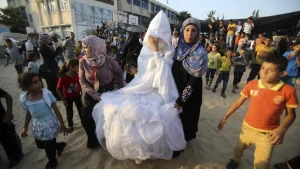In Gaza, love is not postponed — even when life feels uncertain.
Amid bombings, blackouts, and blockades, couples still marry, families still gather, and joy still finds its way through the cracks of war.
A wedding in Gaza is not just a celebration of love — it’s an act of defiance, a message that life will continue no matter what.

Love in the Time of Siege
Planning a wedding in Gaza is unlike anywhere else.
Electricity might go out mid-ceremony, streets could be blocked, and venues may have been rebuilt multiple times.
Yet, despite all this, people find ways to celebrate — whether in a decorated tent, a small courtyard, or even a hospital room.
Couples often say, “If we wait for peace to marry, we might never live.”
So they choose joy now, in the middle of chaos.
Simple Weddings, Deep Meaning
Gone are the lavish ceremonies and expensive halls.
Most weddings today are modest, but they carry deep emotional weight.
Families come together to cook traditional dishes, neighbors share what they have, and musicians play drums powered by small generators.
For a few hours, laughter replaces fear — and everyone remembers what normal life feels like.
Tradition Meets Resilience
Palestinian culture values weddings as sacred social events, symbols of continuity and unity.
Even under siege, these traditions persist: henna nights, folk songs, and dancing with flags of Palestine.
It’s a way of saying: Our culture lives, even if our city struggles.
The Economic Struggle Behind Every Celebration
The blockade has made even simple weddings costly.
Gold prices, rent, and food inflation push many couples to postpone or simplify their plans.
Still, families often pool their savings together — because celebrating love is worth every sacrifice.
In Gaza, weddings are not just personal; they’re communal — everyone contributes to keep the joy alive.
Why These Weddings Matter
Every wedding in Gaza is a statement to the world:
We are still here.
The dancing, the songs, and the bright dresses in the middle of rubble are proof that Gaza’s spirit cannot be destroyed.
Love in Gaza is more than emotion — it’s resistance wrapped in laughter and hope.






